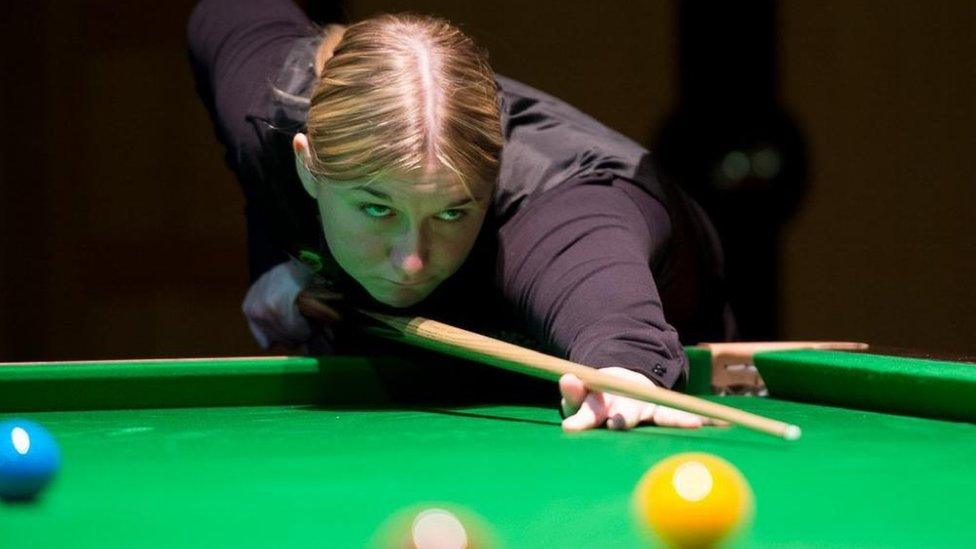Women still snookered by loopy men-only rule in 2019? Give us a break!
- Published
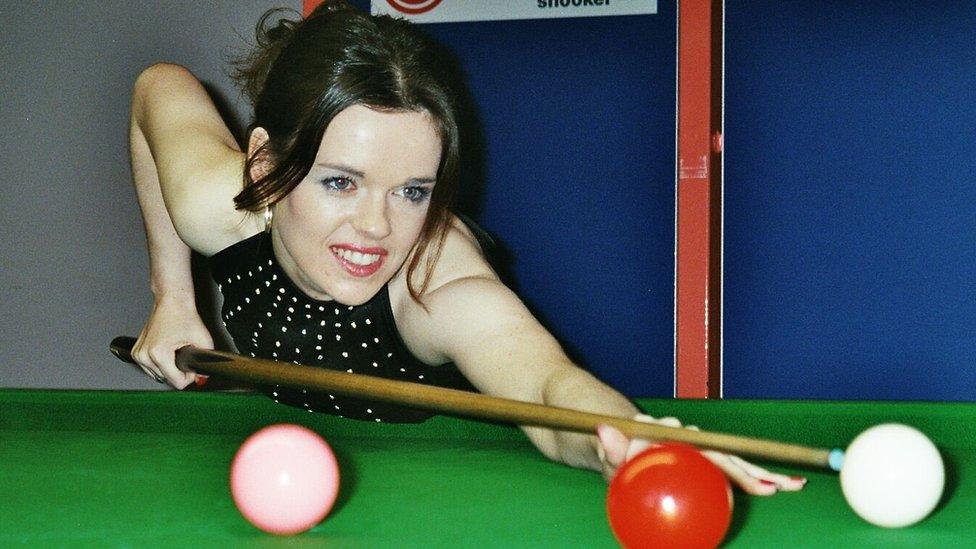
Lynette Horsburgh started playing the game in Blackpool in the 1980s
BBC journalist Lynette Horsburgh, 45, is a former world 8-ball pool champion and was once the world's number one-ranked female snooker player. In the wake of world number three Rebecca Kenna announcing she has quit her local snooker league because of the sexism she faces, Lynette explains what life was like for her in a male-dominated sport.
When I saw Rebecca had left her league in Keighley, West Yorkshire, after being barred from matches simply because she's a woman, I was horrified.
But then even my own daughter Georgie sees the game as a male bastion. I was trying to watch the start of the World Snooker Championship on TV a couple of years ago and asked her to be quiet.
I thought that telling her I had played there - at the Crucible - might impress her and do the trick. "Don't be silly," my five-year-old said. "You're a girl, you can't play there."
Rebecca's fight to play the game she loves has stirred up all sorts of memories from more than 25 years ago - from being banned from three league matches in a week, to being escorted out of clubs and being sneaked in to play quickly "before the committee notice".
Because most of the snooker in my hometown of Blackpool was centred around social clubs, I had my share of battles on and off the table.
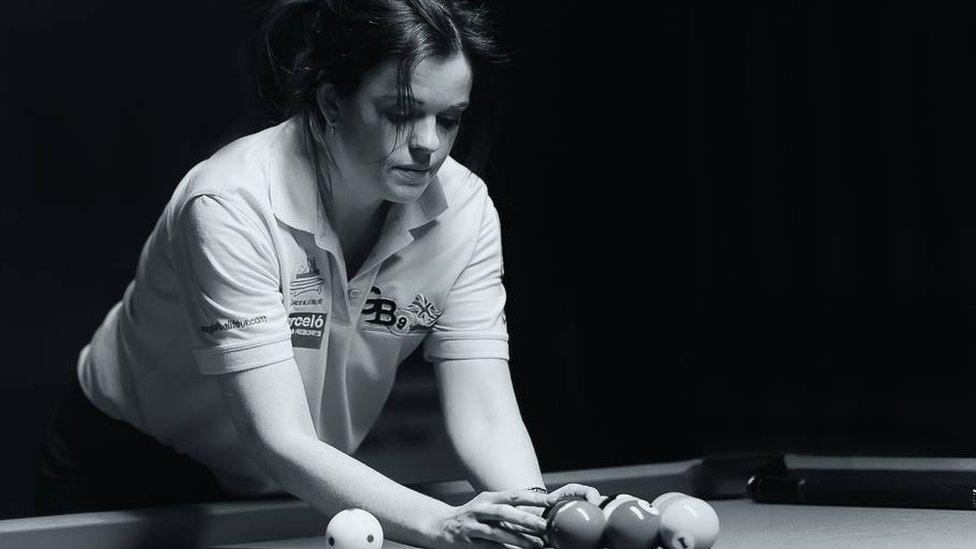
Lynette has since moved on from snooker to pool
I used to get my poor mother to take me on a 25-mile trip every week to play in the Preston & District Snooker League - which welcomed women - for a single frame of snooker.
Clubs there would have to forfeit the game if they refused to let women play and so I was allowed on the table - but I still remember the sign at a golf club over the games room bar which read in this order: "No jeans, no trainers, no women, no dogs."
I entered the Walton Trophy in 1992-93 season - one of Blackpool's two amateur championships, along with the Gazette Cup - and drew a player from the Talbot Conservative Club in Blackpool in the first round.
The rules in that event were that a player would lose home advantage if the club discriminated against women.
The club not only allowed me to play, it asked me to join its team in the Fylde Snooker League, which covered the Blackpool area.
I went on to win the competition and behind the scenes I must have caused a headache for the organisers, because a lot of the venues had to temporarily lift their own rules barring women to let me play.
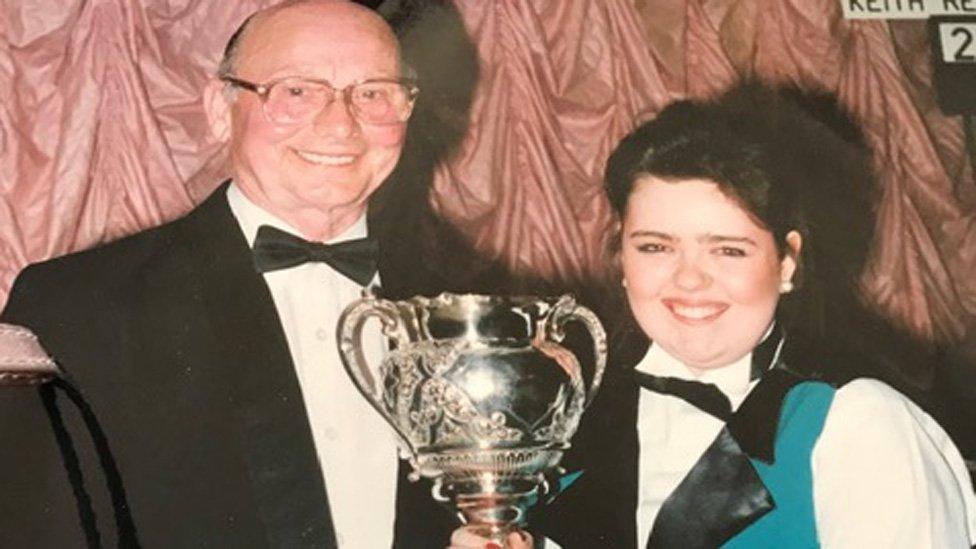
Lynette being presented with the Walton Trophy
In the Gazette Cup I drew Tommy Eaves who played for Fleetwood Conservative Club.
As with the Walton Trophy, he would have lost home advantage if I wasn't allowed to play at the club, so he arranged for us to play at the crack of dawn, with only the cleaners for company, when the committee members weren't in.
The club had a line across the room separating the bar from the tables and women usually weren't allowed to cross it, let alone play.
'It's a woman!'
Talbot Conservatives might have allowed me to compete but it was a different story with about six clubs in the first division of the Fylde League, which adamantly refused to let me play.
I remember my team captain had been assured I would be able to play in our game at Cleveleys Working Men's Club.
But when I arrived for the match, cue in hand, I faced a load of men shouting in disgust: "It's a woman!"
Shortly after, I was led out and told I could come back on New Year's Eve if I wanted to play there.
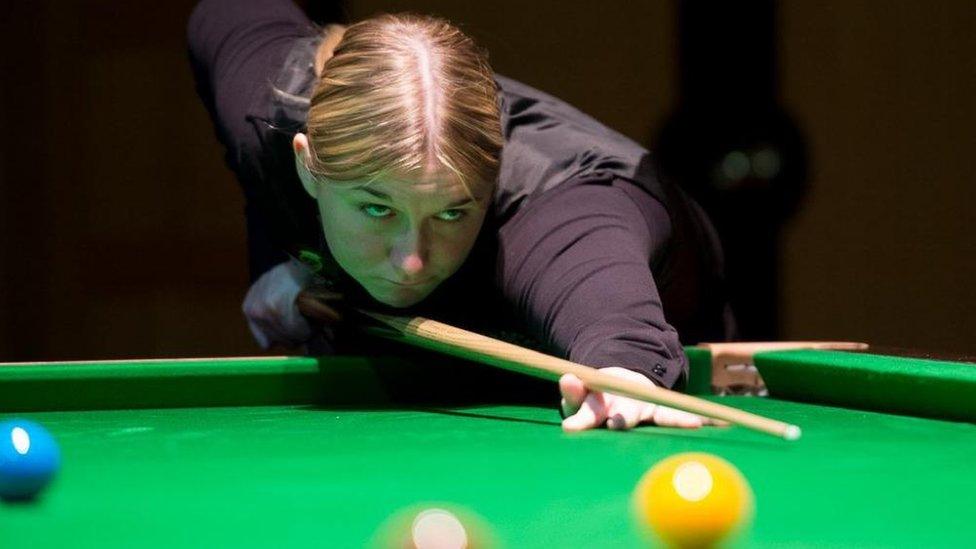
Rebecca Kenna is ranked third in the world in the women's game
Some clubs flouted their men-only stance and let me play - but that could anger female members.
One woman staged a protest when I was at the table. She wanted to know why I was allowed to play, when she was a member and paid her subs but was only allowed in the club as a spectator.
I remember two failed attempts to overturn the men-only rule in place at some clubs in the Fylde League, in particular a heated emergency general meeting in 2002 brought by Mandy Fewings.
Ironically, it was held in the games room at Tyldesley Conservative Club, Blackpool, which women weren't usually allowed to enter.
During that meeting, one of the delegates told me that "women should be in the kitchen".
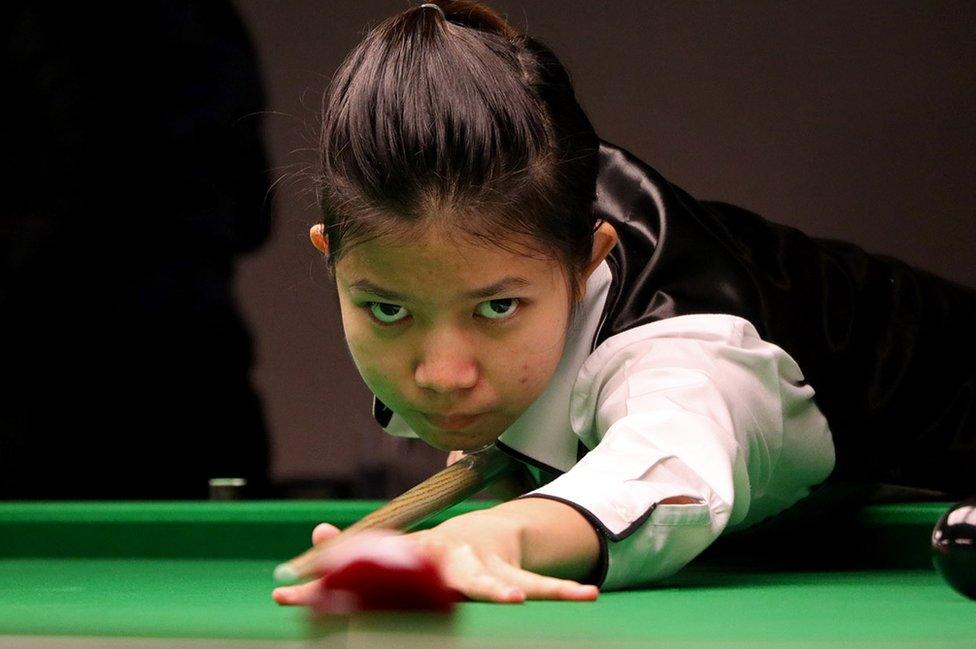
Thai teenager Nutcharut Wongharuthai knocked in a 147 break earlier this month
Mandy, now 59, who was twice North West Ladies snooker champion, had no problem in getting the ban on female snooker players in the Lytham St Annes Snooker League overturned.
I spoke to her about Rebecca and we were both gobsmacked.
Mandy said the Fylde League could have supported us all those years ago but they "didn't have the balls" to stand up to the clubs.
Thankfully, it has all changed now and women in the league can play at all those clubs. Sadly, though, that's still not the case in Keighley.
For all the hassle we had, a lot of people were behind us, though, championing our cause in Blackpool.
For example, there was the late Harry Wyers - nicknamed "Mr Snooker" - who was a player and a referee, as well as being a prolific charity fundraiser.
In the 1980s, he set up Harry's Angels, a team that raised the profile of women's snooker.
And globally, Mandy Fisher, the 1984 women's world professional champion, has been relentless in promoting women's snooker since she was a teenager.
She set up World Women's Snooker (formerly the World Ladies Billiards and Snooker Association) in 1981 and is still president.
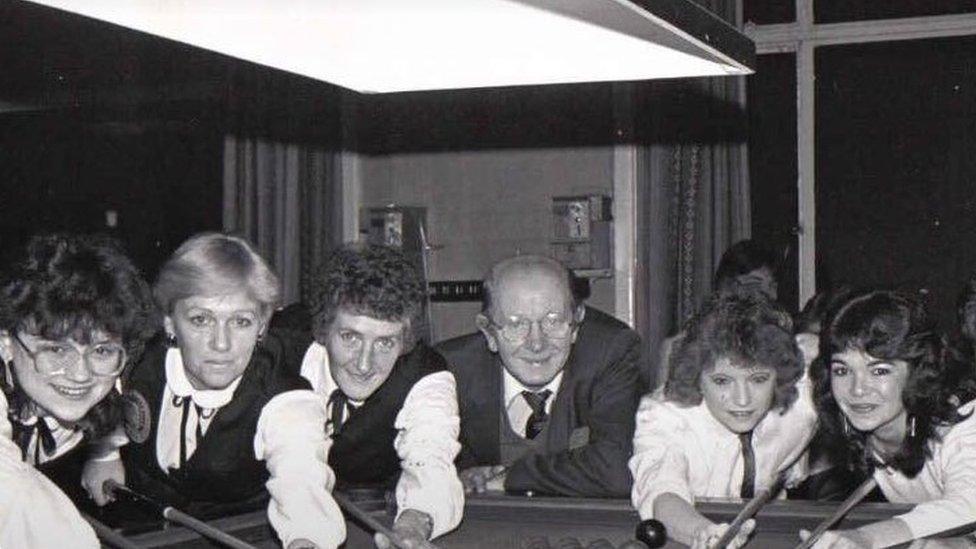
Harry's Angels: Harry Wyers set up a charity snooker team that included Mandy Fewings (far right)
Women's snooker had a lull after tobacco sponsorship was banned in the UK, and it lost its support from World Snooker in 2003, so I started playing pool.
Fortunately, I have never faced any barriers when competing in 8-ball pool or American pool.
Realising the opportunities available to them outside of the UK, Allison Fisher, Kelly Fisher and Karen Corr - all former snooker world champions - moved to the USA to play on the lucrative 9-ball tour.
It has been great to witness their success in America: it really struck me when I competed in an 8-ball event in Las Vegas a few years ago how - quite rightly - they were appreciated and even revered.
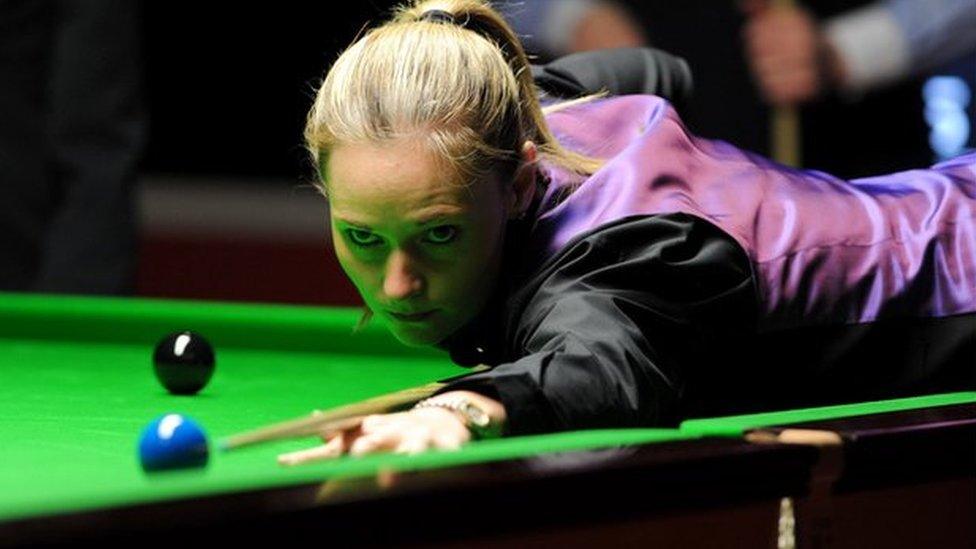
Reanne Evans is hoping to qualify for this year's World Snooker Championship
I'm shocked clubs in the UK are still allowed to discriminate against women in 2019.
I totally support Rebecca in her stance and hope that now MPs are getting involved and urging the two clubs in Keighley to overturn their "archaic" ban on female players, this will be the dying gasp of sexism in snooker.
What's happened to Rebecca has actually come at a time that is really exciting for the women's game. I got tingles when I watched a recording of 19-year-old Nutcharut Wongharuthai from Thailand achieve a maximum break earlier this month.
I think the real game changer will be when a woman qualifies to play at the Crucible in the World Snooker Championship.
It could be as soon as next month, as the current world women's champion Ng On Yee and the 11-time world champion Reanne Evans are battling it out in the qualifying rounds.
And when it happens, I'll make sure my daughter is watching with me.
- Published27 March 2019

- Published26 March 2019
